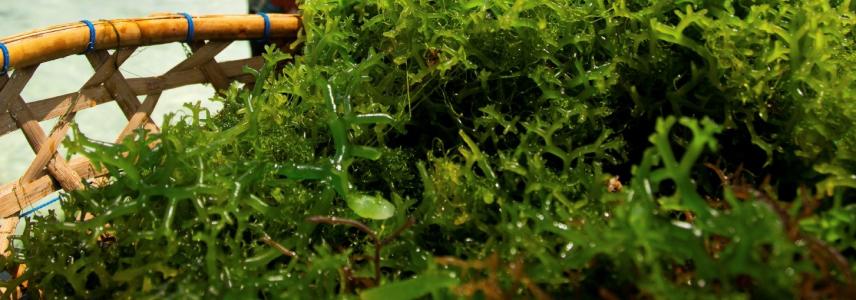Growing appetite for seaweed

Seaweed is finding new applications in the food industry. Consumers are becoming more aware of its health and environmental benefits. This is making them want to try seaweed-based products. Food and beverage companies are also using seaweed in innovative products. The trend provides opportunities for seaweed producers in developing countries.
Seaweed, or marine algae, is experiencing a revival in the food industry. Historically, seaweed was eaten by fishermen, labourers and farmers in Europe, and had the image of being for people with a low income. It is now gaining popularity because of its health and environmental qualities.
Nutrient-rich
Edible seaweed is typically cultivated along marine coastlines in Asia, Europe and North America. Popular seaweeds used in cuisine are dulse, nori, kombu, and Atlantic wakame. Other seaweeds, such as carrageenan and agar agar, are primarily used as food additives.
More and more often, the health benefits of seaweeds are being recognised. Seaweeds are an important source of protein and vitamins, such as vitamins A, C, E, B1, B2, B6, and B12. Seaweed is also rich in iodine, iron, magnesium, potassium, boron, silica, selenium and chromium. Thus, adding seaweeds to food products increases their nutrient density.
No need for pesticides
There are many environmental reasons to eat seaweed. As it is cultivated in the sea, it does not require land. The increasing scarcity of agricultural land is a major sustainability issue in many parts of the world. Unlike food crops, seaweed does not require inputs like pesticides or fertilisers. And it can be grown all year round. Brown seaweed removes nitrogen fertilisers that can pollute marine ecosystems. Seaweed farming can also help protect vulnerable coral reefs by increasing the diversity of local algae.
Increasing demand for plant-based foods
Seaweed is also benefiting from the increase in demand for plant-based foods. Dulse and sleabhac are rich sources of protein. Carrageenan and agar-agar are used as a thickener, stabiliser and gelling agent. They are becoming popular in plant-based products, as they are alternatives to animal-based gelatine.
Seaweed is already established in Asian cuisine. It is widely used in sushi, miso soup, onigiri and related dishes. In Europe, seaweed is finding its way into rice dishes, soups, crackers, pâté and mustard. The food industry is also innovating with seaweeds.
The Dutch company Seamore launched a line of seaweed-based pasta in 2014. The ‘I Sea Pasta’ brand is marketed as a healthy alternative to pasta. It has fewer carbohydrates and fewer calories. Yet, it high in iodine, iron and omega 3 fatty acids. In 2017, Seamore launched its complementary ‘I Sea Bacon’ range. In this range, vegan bacon is made from dulse seaweed. It is marketed as sustainable because it has no meat and is certified as organic. Seamore has built a distribution network for the two brands at retailers across Europe.
The Californian company New Frontier Foods has created a range of noodles, broths, seasonings, sauces and dressings containing certified organic seaweed. It markets its Halo’s Ocean products as healthy and ecological. Its success in the US market led to entry to the UK market in 2020.
Opportunities for seaweed producers in developing countries
The European market offers many opportunities for seaweed producers in developing countries. The use of seaweed and seaweed extracts is growing in the food and natural products industry. Still, few European countries are investing in seaweed production. France, Spain and the Netherlands are the main producers. But, supply is falling short of demand, with imports mainly coming from Asia. China, Japan and South Korea are major sources.
Sustainable seaweed and ethical labels are becoming more and more important. European companies like Algamar and Clearspring focus on organic seaweed-based products. In November 2017, the Marine Stewardship Council and Aquaculture Stewardship Council (ASC-MSC) launched the first sustainable seaweed standard. Gijang Sustainable Seaweed Network (South Korea) and Euglena Co. Gijang (Japan) are the first Asian companies to follow this new standard. This certification shows European buyers that the seaweed has been sustainably produced.
The effects of COVID-19
In spring 2020, most of Europe was severely affected by COVID-19. The resulting health and financial crises will affect the natural ingredients sector. Consumer demand for health products like seaweed-based products is expected to rise as consumers look for products to boost their immune system. European food companies are expected to ask more questions about supply chains and traceability. Certification schemes are likely to become more important. Prospective exporters should take note of this.
For more details, see CBI’s reports on the European market for edible seaweed and the European market for seaweed extracts.
This news article was written for CBI by Ecovia Intelligence.
Stay informed
To stay informed on the latest developments in the natural food additives sector, make sure to subscribe to our newsletter.